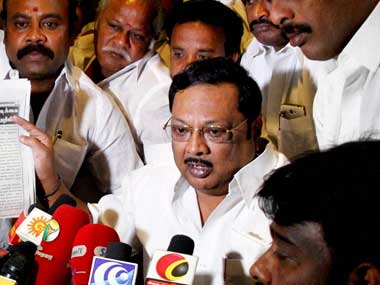The battle between Stalin and Alagiri for the reins of the DMK has been on for years now, but the suspension, threats and drama that the latter is embroiled in may just be the end of the elder sibling’s attempt to lay claim to power in the party. Alagiri’s suspension was initially seen as a family drama that was playing out purely because he had opposed younger brother Stalin’s and Karunanidhi’s plan to ally with the DMDK for the national elections. However, DMK chief M Karunanidhi’s revelation that Alagiri threatened the party’s heir apparent means that the former Union Minister isn’t likely to find any favour in the party any time soon. Describing what led to the suspension, Karunanidhi told party workers,““He (Alagiri) has some unknown hatred against Stalin. Alagiri even said Stalin would die in three months. No father can tolerate such words against a son. As the party chief, I had to tolerate them.” [caption id=“attachment_1365045” align=“alignleft” width=“380”]  Alagiri has seen his influence steadily wane in the party. PTI[/caption] Alagiri’s suspension from the posts of the party will have little impact on his standing in the party. Head of the party’s southern units in the state, the MP from Madurai has never had the backing of the party or Karunanidhi but managed to claw his way up to a position of power through his own machinations. A detailed Tehelka profile of the Karunanidhi’s extended family describes how Alagiri being sent off to Madurai in the 1980s was a move that was close to banishing him from the party for indiscipline. Despite being shunned, Alagiri built up a loyal cadre that reportedly relied on extortion, threats, illegal handouts and violence to ensure that the southern parts of the state voted for no one else. Stalin, on the other hand, was picked up to campaign for the party, after half brother MK Muthu failed to make anything of his political career, and gradually built up a following in the cadre of the party across the state. With his father’s backing, the younger sibling quickly managed to build support among the rank and file of the party across the state and for long was perceived as the next in line after Karunanidhi decided to call it a day. While Alagiri was sent to the Centre as a Union Minister under UPA-II, Stalin became deputy chief minister and built up support within the party. Alagiri may have been in the Centre, but his focus has always been the state and has reportedly been pitching for a higher post in the party for years now. “It is clear that Alagiri wants to position himself in a key position within the party from where he can rally the support of MLAs and district secretaries during a succession war after Karunanidhi,” a senior minister was quoted as saying in a 2010 Telegraph report. Alagiri then reportedly enjoyed the support of half sister Kanimozhi, herself a Rajya Sabha MP, and he had promised her his ministerial post in the Union Cabinet if he took on a bigger role in Tamil Nadu politics. Then came the state elections which was the great leveller for the party. Swept aside by the AIADMK in 2011, DMK lost even second position to the DMDK and Alagiri was perhaps worse hit with his key constituencies lost to the opposition. Since the decimation, Stalin has been building support among the party cadre even in Alagiri’s once assumed citadel of Madurai. The party also eroded Alagiri’s support base in the party by expelling key senior aides. In the past, Alagiri never took kindly to the party interfering in his key constituencies. In 2001, he had reportedly wrecked the DMK’s campaign for the assembly elections by putting up candidates to contest against the party’s in the areas where he held sway. But this time round, the DMK’s prospects in the upcoming elections aren’t very rosy. According to the Lokniti-IBN Tracker Poll, the DMK seems to be headed for a drubbing. Its voteshare of 23 per cent in 2009, could reportedly fall as low as 18 per cent if the elections were held this month. In the 2014 national elections, Alagiri’s opinion may not matter as much given his waning political influence and the importance for the DMK to remain politically relevant. Whether the DMK will also make the most of Alagiri being sidelined to put its succession plan finally in place so that Stalin has a clear path to plan the party’s political strategy remains to be seen. Stalin may have asked party workers not to burn his brother’s effigies, but for Alagiri it may be time to be wondering whether his effigies will find any other place in the party’s activities any time in the near future.
Alagiri’s battle for control of the DMK against brother Stalin has been on for years. But has Karunanidhi effectively ended it this time?
Advertisement
End of Article


)
)
)
)
)
)
)
)
)



